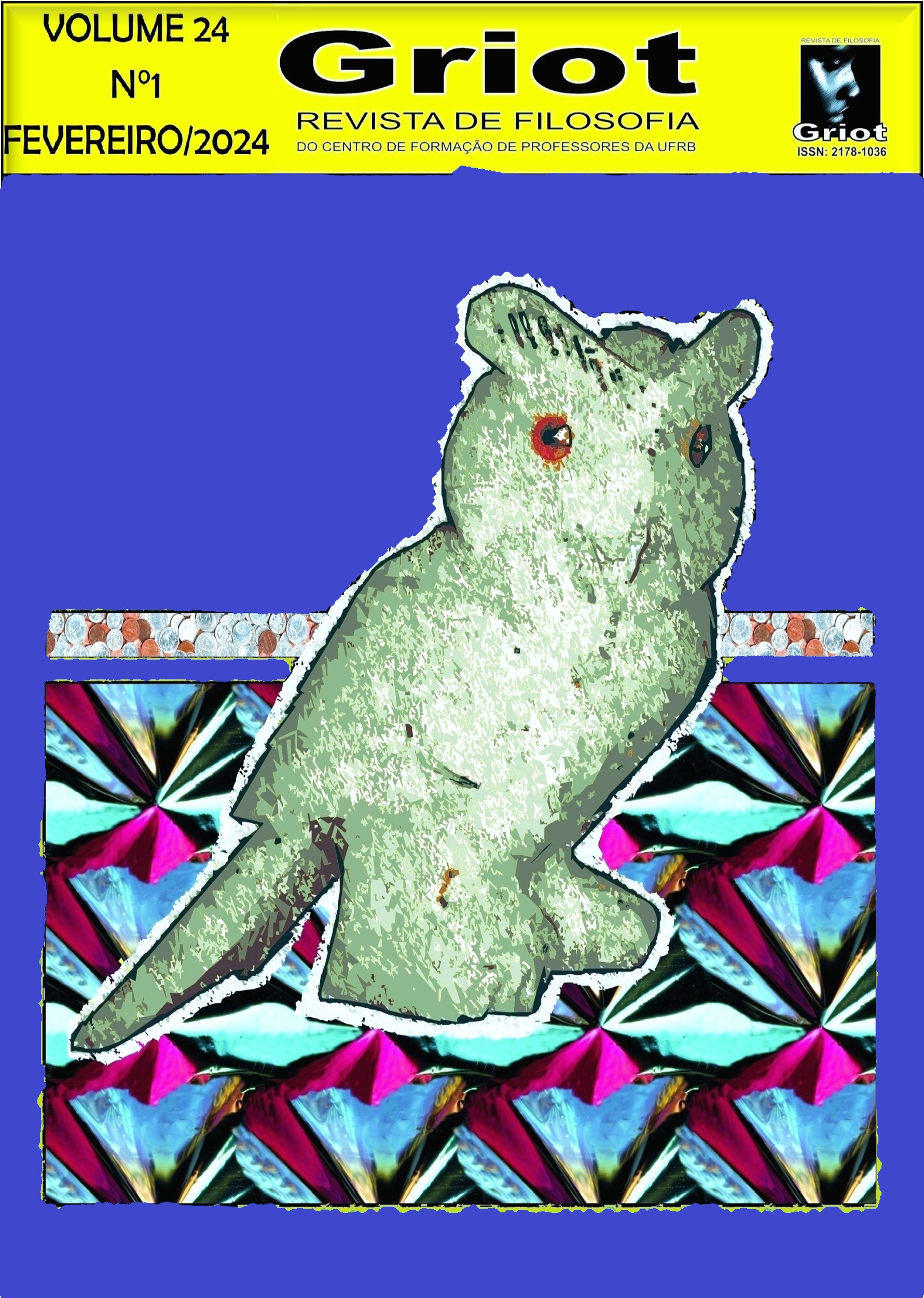A importância dos sentimentos existenciais para a compreensão da enfermidade
DOI:
https://doi.org/10.31977/grirfi.v24i1.3595Palabras clave:
Emoção; Sentimento Corporal; Sentimento Existencial; Dúvida Corporal; Enfermidade.Resumen
Ao contrário das emoções, os sentimentos existenciais não são dirigidos a um objeto ou situação específica, mas são o pano de fundo afetivo através do qual a experiência como um todo é estruturada. Adicionalmente, os sentimentos existenciais são sentimentos corporais. Nesta direção, o presente artigo tem como objetivo apresentar a teoria dos sentimentos existenciais desenvolvida por Matthew Ratcliffe em Feelings of Being: Phenomenology, psychiatry and the sense of reality (2008) e o seu vínculo à noção de “dúvida corporal” desenvolvida por Havi Carel em Phenomenology of illness (2016), a fim de explicitar a importância dos sentimentos existenciais para a compreensão da experiência da enfermidade. O artigo é dividido em três seções: 1) Caracterização da natureza das emoções e dos sentimentos; 2) Caracterização dos sentimentos existenciais a partir da fenomenologia da experiência táctil, bem como a distinção entre sentimento existencial, emoção e sintonia afetiva; 3) Análise da alteração dos sentimentos existenciais pela dúvida corporal.
Descargas
Citas
CAREL, Havi. Phenomenology and its application in medicine. Theoretical Medicine and Bioethics, Berlin, v. 32, n. 1, p. 33-46, 2010.
CAREL, Havi. Illness, phenomenology, and philosophical method. Theoretical Medicine and Bioethics, Berlin, v. 34, n. 4, p. 345-357, 2013.
CAREL, Havi. Conspicuous, obstrusive and obstinate: A Phenomenology of the ill body. In: MEACHAM, Darian. (ed.). Medicine and society, new perspectives in continental philosophy, Berlin: Springer, 2015. p. 119-121.
CAREL, Havi. Phenomenology of illness. Oxford: Oxford University Press. 2016. 248 p.
CAREL, Havi. Pathology as a phenomenological tool. Continental Philosophy Review, Berlin, v. 54, p. 201-217, 2021.
DELANCEY, Craig. Commitment and attunement. Phenomenology and the Cognitive Sciences, Berlin, v. 13, n. 4, p. 579-594, 2014.
FREEMAN, Lauren. Toward a phenomenology of mood. The Southern Journal of Philosophy, Hoboken, v. 52, n. 4, p. 445-476, 2014.
FUCHS, Thomas. The phenomenology of affectivity. In: FULFORD, K. W. M.; DAVIES, Martin; GIPPS, Richard; GRAHAM, George; SADLER, John Z.; STANGHELLINI, Giovanni; THORNTON, Tim (ed.). The Oxford Handbook of Philosophy and Psychiatry, Oxford: Oxford University Press, 2013, p. 612-631.
GILARDI, Pillar. Heidegger: la pregunta por los estados de ânimo (1927-1930). México: Bonilla Artigas Editores, 2013. 204 p.
GUMBRECHT, Hans. U. Sintonia, ambiência, Stimmung: sobre um potencial oculto da literatura. Tradução de Ana Isabel Soares. Rio de Janeiro: Contraponto: Editora PUC Rio, 2014. 174 p.
HEIDEGGER, Martin. Ser e tempo. Tradução de Fausto Castilho. SP: Editora da Unicamp, Rio de Janeiro: Editora Vozes, 2012. 1199 p.
HEIDEGGER, Martin. Os conceitos fundamentais da metafísica: mundo, finitude, solidão. Tradução de Marco Antônio Casanova. 2 ed. Rio de Janeiro: Forense Universitária, 2015. 486 p.
JAMES. W. What is an emotion? Oxford Journal. Oxford University Press on behalf of the Mind Association: Vol. 9, No. 34, p. 188-205, abril de 1884.
RATCLIFFE, Matthew. The feeling of being. Journal of Consciousness Study, Exeter, v. 12, n. 8, p. 43-60, 2005.
RATCLIFFE, Matthew. Feeling of being: phenomenology, psychiatry and the sense of reality. Oxford: Oxford University Press. 2008. 320 p.
RATCLIFFE, Matthew. The phenomenology of existential feeling. In: FINGERHUT, Joerg.;
RATCLIFFE, Matthew. Existential feeling. In: SZANTO, Thomas; LANDWEER, Hilge (ed.). The Routledge Handbook of Phenomenology of Emotion, Abingdon: Routledge, 2020. p. 250-261.
REIS, Róbson R. A abordagem fenomenológico-existencial da enfermidade: uma revisão. Natureza Humana, São Paulo, v. 18, n. 1, p. 122-143, 2016.
REIS, Róbson R. Illness and generality. Analytica, Rio de Janeiro, v. 22, n. 2, p. 174-191, 2018.
REIS, Róbson R. Fenomenologia Hermenêutica e as noções de confiança e memória corporal na descrição da experiência da enfermidade. Prometheus, São Cristóvão, n. 33, p. 101-128, 2020.
SOLOMON, Robert. Emotions in phenomenology and existentialism. In: DREYFUS, Hubert L.; WRATHALL, Mark A. (ed.). A Companion to Phenomenology and Existentialism, Oxford: Blackwell Publishing, 2007. p. 291-309.
SVENAEUS, Fredrik. Naturalistic and phenomenological theories of health: Distinctions and Connections. In: CAREL, Havi; MEACHAM, Darian. (ed.). Phenomenology and Naturalism, Cambridge: Cambridge University Press, 2013a. p. 221-238.
THONHAUSER, Gerhard. Beyond mood and atmosphere: a conceptual history of the term Stimmung. Philosophia, Berlin, v. 49, n. 3, p. 1247-1265, 2020.
WEBERMAN, David. Heidegger and the disclosive character of the emotions. Southern Journal of Philosophy, Hoboken, v. 34, n. 3, p. 379-410, 1996.
Descargas
Publicado
Cómo citar
Número
Sección
Licencia
Derechos de autor 2024 Brenda Rossi Anhanha

Esta obra está bajo una licencia internacional Creative Commons Atribución 4.0.
Los autores que publican en Griot: Revista de Filosofía mantienen los derechos de autor y conceden a la revista el derecho de primera publicación, con el trabajo simultáneamente licenciado bajo la Creative Commons Attribution 4.0 International License, permitiendo compartir y adaptación, incluso con fines comerciales, con el debido reconocimiento de la autoría y publicación inicial en esta revista. Lea mas...









































































